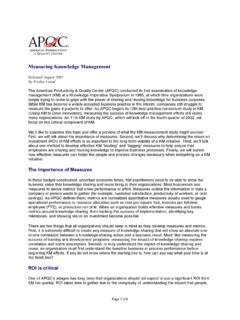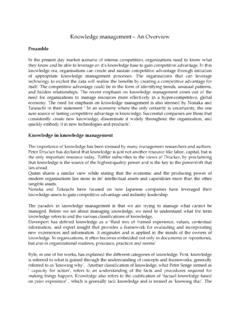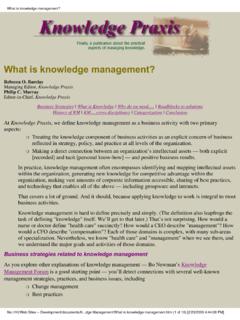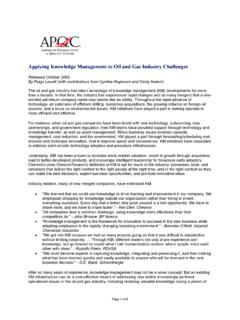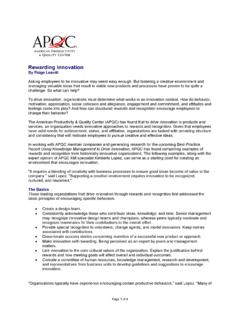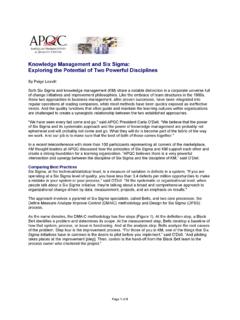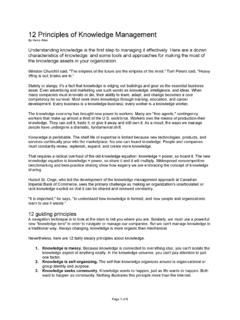Transcription of Five reasons people don't tell what they know by …
1 five reasons people don't tell what they know by Carol Kinsey Goman Saturday, June 22, 2002 Some years ago, I gave a speech to a group of information, knowledge and corporate communication executives. I was speaking about change, rather than knowledge management. But at the end I asked "How many of you are comfortable sharing what you know?" Out of an audience of 200, only three hands went up. Clearly, if the people responsible for managing, creating, promoting and leading the concept of sharing knowledge were uncomfortable doing it themselves, we were looking at a big problem--a human problem, not a technology problem. And yet, when I looked through the research, most of the literature was on technology; some of it was on corporate culture; but none of it was on individual inhibitors and motivators to sharing. There is a huge amount of knowledge at all levels of an organization: about what customers need, how processes could be improved, or what new products and services could be developed.
2 In trying to capture and communicate this cumulative wisdom, corporations have invested hundreds of millions of dollars in corporate portals, collaborative software and KM-oriented intranets. But knowledge sharing is more than the technology that supports it, more than a business strategy aimed at optimizing a company's experience and expertise, and even more than a cultural shift from the industrial to the information age. Knowledge sharing is, first and foremost, about people . "Getting people to really share what they know is required now if you going to start letting the Net modernize the organization," says Laurence Prusak, IBM's top knowledge guru. In the perfect knowledge-sharing model, managers are valued not because they know more than their staffs, but because they can quickly communicate to their staffs what they know and get staff members to do the same with each other.
3 Leaders build environments of trust and mutual respect where creative contribution is nurtured, and where employees at all levels understand that being successful in this networked world increasingly requires collaboration. That's the ideal. The reality is somewhat different. I have recently completed a survey of 200 mid-level managers about the state of knowledge sharing in their companies, which confirms what many KM practitioners have been experiencing. All too often team leaders withhold information and dole it out on a "needs to know" basis, executives ask for collaborative input when what they really want is a "rubber stamp" for decisions already made, and people aren't sharing what they know due to a variety of personal and organizational inhibitors. These human barriers underscore the importance of tackling the people issues in knowledge management before relying on technology to improve communication.
4 This is becoming an extremely expensive reality. International Data Corporation developed a metric by which to measure what they refer to as the "knowledge deficit." It captures the costs and inefficiencies that result from intellectual rework, substandard performance and the inability to find knowledge resources. According to this metric, the knowledge deficit among Fortune 500 companies costs them, conservatively, $12 billion annually. In addition to that, best practices and lessons learned have the potential to save companies billions of dollars more. Kenneth Derr, the [former] CEO of Chevron, sees the situation this way: "Every day that a better idea goes unused is a lost opportunity. We have to share more, and we have to share faster. I tell employees that sharing and using best practices is the single most important thing they can do.
5 " Easier said than done. There are many reasons why people are reluctant to share what they know. they are busy and don't have time to share. they forget to share. they don't want the additional work and responsibility that Page 1 of 3 goes with sharing. they are assigned to projects they feel are unworthy of their contribution (a derisive term for is WOMBAT--waste of money, brains and time). But, as common as these conditions may be, they were not the responses I found most often in my research. Here are the top five reasons why people don't tell what they know: 1. people believe that knowledge is power "If I know something you don't know, I have something over you." (These quotes are from managers in my study.) Educational systems are designed to discourage information sharing. If I give you an answer during a test and we are graded on a curve, I have put myself at a disadvantage (not to mention at risk of being labeled a cheater).
6 Most people still struggle with the idea that "if I tell you what I know, I lose something." When a company's evaluation, promotion and compensation are based on relative numbers, the perception is that sharing knowledge will (always) reduce the chance of personal success. Therefore, the first obvious solution is to change the reward system. Find ways to reinforce and reward knowledge sharing. Recognize and promote people who learn, teach and share. And penalize those who do not. In all best-practices companies, hoarding knowledge and failing to build on ideas of others have visible and sometimes serious career consequences. At American Management Systems, "leveraging" what you know by educating colleagues, writing, helping others and teaching junior staff is how you build your reputation as a world-class thought leader and how you get promoted to partner.
7 Second, understand that there are more powerful motivators than money. For 25,000 Xerox field service technicians around the world, contributing to the Eureka database of maintenance tips is an opportunity to become known as a thought leader. To be personally identified with the solution to a difficult problem, in front of Xerox service reps all over the world, is the biggest incentive in getting people to contribute. At Xerox, they demonstrate that knowledge hoarding is no longer power, but a reputation for knowledge sharing is. 2. people are insecure about the value of their knowledge "I feel that people tend to underestimate life experience, that intellect has been so over praised, and for some people without a formal education, that it is hard for them to believe that they can add value in a very different way." My latest book, Ghost Story: A Modern Business Fable, features a character who doesn't share knowledge because she believes she has nothing to contribute.
8 Dot (the book's heroine) is an example of what educators refer to as "unconscious competence." Simply put, she doesn't know what she knows. And, because she is outranked and intimidated in all team discussions, she believes her input has no value. (In the end, of course, it is her courage, strength, and innate wisdom that save the day.) There are mini-cultures in every organization. Regardless of the overall corporate culture, individual managers and team leaders can nurture a climate for collaboration within their own work group or staff. And the best of these leaders do so by taking the time and effort necessary to make people feel safe and valued. they emphasize people 's strengths while encouraging the sharing of mistakes and lessons learned. they set clear expectations for outcomes and clarify individual roles. they help all members recognize what each of them brings to the team.
9 they model openness, vulnerability and honesty. they tell stories of group successes and personal challenges. And most of all, they encourage and respect everyone's contribution. 3. people don't trust each other "I didn't know the other members of the team personally, so I didn't trust them." A culture for collaboration must be based on trust. Yet, too often, in the rush to get started on a new project, we get groups of people together and tell them to "get to work." This approach proves less than productive, as the group hasn't had time to discover each other's strengths and weakness nor to develop a common understanding and vision for the project. In addition, high turnover, mass layoffs and early retirements make it extremely challenging to develop the mutual trust necessary to build strong relationships throughout the organization.
10 Page 2 of 3 Page 3 of 3 Even the motivation for individuals to contribute knowledge to an electronic data base is largely dependent on the relationship of the members who use the system. If individuals do not trust others with their knowledge, or don't trust that others will contribute in kind, it is unlikely that the system will be effective. Technology can facilitate knowledge sharing but it is trust that enables it. Since people are naturally reluctant to share information with others when they don't know them well enough, the solution begins with creating opportunities for people to meet and interact in both formal and informal settings. And don't rush them. Give people time to develop relationships, to evaluate each other's trustworthiness, and to learn each other's strengths and weaknesses well enough to adapt constructively to them.
